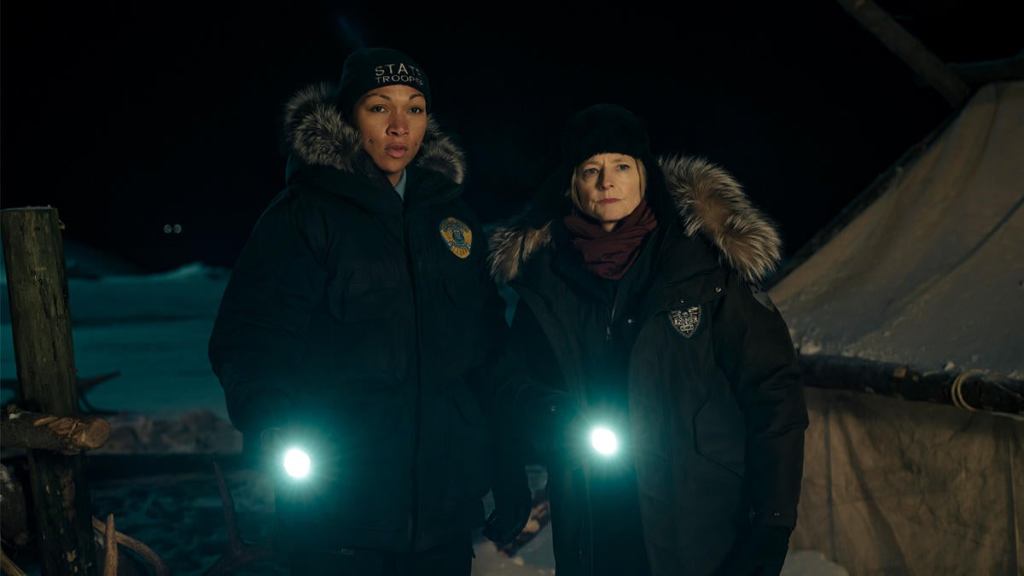The first season of True Detective debuted in 2014 and, thanks in large part to it being developed by the mostly unknown writer Nic Pizzolatto, the series became a surprise success. Anchored by top-tier stars Matthew McConaughey, Woody Harrelson, and Michelle Monaghan, that first season took a traditional detective story and injected it with time jumps and a sense of the supernatural to elevate the adventure into an immensely engaging experience. Being an anthology, the next two seasons, while written by Pizzolatto and also featuring impressive actors, failed to capture the attention of audiences or critics in quite the same way. Now, with True Detective: Night Country, showrunner Issa López brings the series back to its more unsettling roots, delivering audiences a twisted and terrifying tale that is the best the series has been since that debut season.
Set in northern Alaska, a team of researchers working on a mysterious project goes missing, causing Liz Danvers (Jodie Foster) to investigate. When the men are found, evidence of the bizarre event could provide a connection to an unsolved murder that Evangeline Navarro (Kali Reis) could never let go, as the pair work together to uncover the events that led to the grisly deaths of these researchers. In traditional True Detective nature, their investigation unravels a web of revenge, greed, coverups, politics, racism, and even a bit of the supernatural.
Videos by ComicBook.com
With all seasons of True Detective being anthology narratives, both audiences and filmmakers have struggled to define what it was about that first season that resonated so strongly with viewers and what it is that defines the nature of the concept. For the first three seasons, the essence of the series was that they were all detective stories that Pizzolatto wrote, regardless of what themes these narratives touched upon. Interestingly, Night Country started its life as an entirely independent story from López that had nothing to do with that iconic TV show, with HBO noting there were enough similarities to their popular program that, with some tweaks, this story could easily be folded into the True Detective banner. This could prove to be the key to this season’s revival of the franchise, as López seemingly was able to avoid aiming to replicate the success of the debut season and could instead deliver the best story imaginable, only to retroactively find some tonal and narrative connections to its predecessors to make for a more cohesive venture.
López landed on many genre fans’ radars thanks to her 2017 film Tigers Are Not Afraid, a magical-realist story about young children caught in the aftermath of a Mexican drug war. Fans of that film will quickly connect with the tone of Night Country, as it not only offers an entertaining story on the surface, but she also managed to organically inject culturally relevant conflicts of this isolated community. Complicating the overall events of Ennis, Alaska are the growing tensions between the Inuit community and the rest of the town’s residents, as a mining operation brought money and jobs to the town, though at the cost of the mining operation destroying the land, increasing pollution, and contaminating water supplies. None of these concepts are being explored for surface-level enrichment or narrative distractions and are key components of the entire storyline.
Night Country feels less like a replication of that first season and instead serves as a mirror of that journey’s more effective elements; Season 4 trades the humid and sun-baked South for the frigid winter of Alaska at the time of year when the darkness is inescapable. Rather than the fringe beliefs of more radical religions, revival tents, and cult-like worship seen in Season 1, we’re seeing communities who believe in the land and something far more ancient and powerful than can even be grasped by outsiders. While previous seasons had opening credits featuring Blues-inspired riffs, Night Country opens with Billie Eilish’s “bury a friend,” signaling to audiences just minutes into the season premiere that we’re venturing into fresher territory.
The first three seasons of True Detective tackled some intense themes, though all fell more into the realm of thriller and noir genres, with Night Country easily being the most horror-centric story the series has seen yet. The isolation of a research team in a frigid environment will immediately feel reminiscent of John Carpenter’s The Thing, while the plunge into a seemingly endless darkness will remind fans of the vampiric 30 Days of Night. There also feels to be a lot of influence from the real-life Dyatlov Pass incident back in 1959, as both events focus on the mysterious disappearance and discovery of researchers with no clear explanation for frozen bodies, nearby clothing, and destroyed or missing body parts. Night Country will satisfy horror fans more than any other season, thanks to an omnipresent sense of unease and darker forces, as well as a handful of jump scares, though not at the cost of alienating audiences more interested in the detective story. Episode 2, though, features a horrifying scene of body horror that will likely go down as one of the year’s most memorable and unnerving.
Even if Night Country bucks some trends of True Detective, one constant it maintains is a compelling cast. Foster, having won an Oscar for playing detective Clarice Starling in The Silence of the Lambs, is as good as ever in her return to true crime. What feels fresh about her Danvers, both for Foster and for the series, is that our leads typically have superiors to report to, but given the isolated nature of this Alaskan town, she gets to call the shots, even when she’s overextending her reach and asking too much of people, to their detriment. Boxer-turned-actor Reis brings a physicality and intensity that isn’t often highlighted in the series, yet does so with restraint and an unexpected vulnerability, allowing her to avoid being pigeonholed into being a stereotypical character who is merely rough around the edges. The ensemble is rounded out by actors like John Hawkes, Christopher Eccleston, Finn Bennett, and Fiona Shaw, with every supporting character in the series being as complex, empathetic, and problematic as the leads.
Everything about Night Country feels like a success, which should all be championed, but what prevents it from being excellent is that it never quite feels like more than the sum of its parts. We’re given a compelling murder mystery that’s injected with elements of cosmic horror, we’re given troubled characters that resonate with us, and we’re given a satisfying resolution, all while López manages to organically inject an effective exploration of the exploitation of native cultures. All of it works, and its six-episode length gives more urgency to the story, yet it is never quite transcendent. You can’t help but wonder if Night Country would have worked better on its own, without having to incorporate branding and narrative connections to the beloved series, or if it would have been stronger without these references. (Also worth noting is that the connections to that debut season amount to little more than glorified Easter eggs, so don’t count on learning more about the Yellow King or Carcosa.) In fact, it makes the viewer wonder why Night Country was lumped into True Detective while 2021’s Mare of Easttown, a similarly compelling murder mystery featuring a star cast, rural setting, and grisly outcome, was allowed to exist as its own story.
True Detective fans who felt disappointed by the previous two seasons will appreciate the overall premise of Night Country and its more straightforward investigation into a gruesome crime, which is anchored by talented performers bringing to life tremendously flawed figures who still feel compelled to do what’s right. Those fans who felt mostly drawn to the implication of supernatural forces in Season 1 will also feel satisfied by how Night Country leans even further into those elements, cementing this story firmly in the world of horror. Luckily, the horrors of the series won’t entirely turn off all audiences, as fans of films like Wind River, Hold the Dark, and Insomnia will also be engaged by the frozen foray into a small-town murder. Night Country proves there can still be life in the True Detective brand, so long as HBO continues to empower ambitious storytellers like López, while also showcasing that a gripping adventure is comprised of far more than just a recognizable title. Whether Night Country would have been better as a standalone series or not will never be known, but after waiting nearly a decade, longtime True Detective fans will be pleased to see that this new season is the best the franchise has been since we first learned that time was a flat circle.
Rating: 4 out of 5
True Detective: Night Country premieres on HBO on Sunday, January 14th at 9 p.m. ET.





